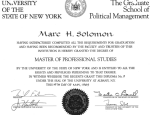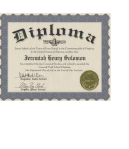 [/caption]
[/caption]Two diplomas collided with my in-box on an early fall in late summer Friday afternoon. The first was inspired by a background checking third-party.
Actually "third" is probably too intimate a term for the degrees separating the four alien parties who picked up my case and blindly resubmitted the same craven information collection request:
“Despite many attempts, we have not been able to verify your degree/attendance at George Washington University. We are contacting you to ask that you send support documentation such as a transcript or copy of your diploma to verify your education there.”
In round one I responded with a 2002 email request for my Graduate School to produce an academic transcript when I flirted with a library of science degree. The punch-line that year was that the school had lost a good chunk of its earliest academic histories when the files were U-Hauled from East 18th Street in lower Manhattan. That was in 1991 when the school relocated from CUNY ("City University of New York") to George Washington University. Librarian degree or no degree, no sane archivist is going to hang onto 9 year-old memoranda detailed a lost transcript.
But Friday after I got the second boilerplate of verify emptor I shifted out of email search and broke my nine-year silence with the school. After all, the 4th party background checkers didn't need my GPA -- they just wanted to know that I wasn't inventing a graduate degree in electing people to office. Could the aggravation be worth the excavation? Imagine what I learned in a class room impacting what I do for a living? "Nothing farfetched about that" I can almost fathom Neil Fabricant saying.
Fabricant was the school's founder. In 1986 he took out a full-page ad in the New York Times to drum up interest in a graduate program for political consultants -- the equivalent to the MBA for management consultants. He framed his pitch with a tag line I'll never forget:
"Politics is a good thing."
Fabricant was channeling Center of Politics Director Larry Sabato. He was trying to say that the art of the deal deserved a Master of Deal Arts. Hard to believe but it sounded as unfashionable in 1987 in the era of Lee Atwater as it does in the post debt ceiling recriminations of today. Then again who would start a political consulting school in NYC instead of DC? Maybe those obliterated records were supposed to remove any hint of this fundamental miscue. Back then the Shuttle was $49 so flying Mark Mellman, Doug Bailey, Celinda Lake et al. in weekly might have been plausible for one or two board meetings at best.
I remember another memorable tagline made by the school's first head of admissions, financial aid, and registrar named Christine Solomon who told me the school wanted its students to be "needs blind." This meant that we could gather up the courage to be the inaugural lab rats. Such gumption would release us from fretting over trivialities like student loans. At the time I was confused. Was she was trying to outfit my billfold with a blindfold or hold my blindside with a jello mold?
To others in the program this loan is blind first impression was prescient and they refused to pay their balances without qualifying first for the Neil Fabri-card. Years later something preordained in the unhappiness of those first class campers rubbed off on the crates of records in the U-HAUL on moving day. Since then, we specimens have been chasing down a credential I stopped using long before the age of the permanent campaign arrived.
On Friday the curse of the Fabricard, the jello mold, and Lee Atwater's tormented spirit all lifted. I reached three GSPM employees in a row who were all patient, resourceful, and ultimately effective in helping me produce the long delayed official degree conferred through the dazzle of scanned diplomas basking eternal in PDF splendor. The bureaucracy of the background checkers could now recede into a dormant state of permanent dimmer.
One Diploma, Two Graduations
No sooner had I thrown down the lights on my career in political degree recapture I got an attached PDF of my son's high school degree from the Seton Home Study program. Jerry finished his studies a month or two ago but the big momentous certificate arrived last week. He wasn't shouting or jumping up and down but "was very happy to have it" as is his accustomed state of graduated adulation. His mom held back the tears -- most of them anyhow.
I'm glad that mom stayed on top of the situation. I'm grateful for her sacrifices as a home school educator. I'm glad that she stayed on top of the paperwork. I'm glad that our son won't be asking Seton administrators in 2034 to search on all the Jerry Solomons in their “early two thousands” archives. I can’t possibly know what it’s like to bring that diploma to life.
But I am perhaps most ultimately grateful that Jerry knows what it’s like to don the graduation gown and hat and walk with the Greenfield High School class of 2011 – something no virtual degree will ever confer. The fact his high school experience bears the certifiable and the ceremonious is a tribute to Jerry.
Loud and clear.
When the interim director of student affairs ran my name against her screen records last Friday, there were three Marc Solomons who appeared -- none of them related to Christine Solomon or myself.



No comments:
Post a Comment